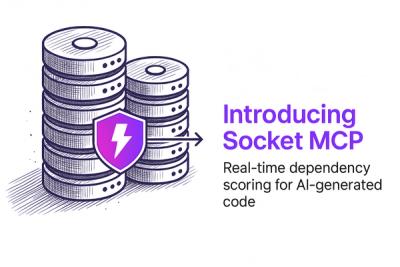
Product
Secure Your AI-Generated Code with Socket MCP
Socket MCP brings real-time security checks to AI-generated code, helping developers catch risky dependencies before they enter the codebase.
github.com/kelseyhightower/envconfig
import "github.com/kelseyhightower/envconfig"
See godoc
Set some environment variables:
export MYAPP_DEBUG=false
export MYAPP_PORT=8080
export MYAPP_USER=Kelsey
export MYAPP_RATE="0.5"
export MYAPP_TIMEOUT="3m"
export MYAPP_USERS="rob,ken,robert"
export MYAPP_COLORCODES="red:1,green:2,blue:3"
Write some code:
package main
import (
"fmt"
"log"
"time"
"github.com/kelseyhightower/envconfig"
)
type Specification struct {
Debug bool
Port int
User string
Users []string
Rate float32
Timeout time.Duration
ColorCodes map[string]int
}
func main() {
var s Specification
err := envconfig.Process("myapp", &s)
if err != nil {
log.Fatal(err.Error())
}
format := "Debug: %v\nPort: %d\nUser: %s\nRate: %f\nTimeout: %s\n"
_, err = fmt.Printf(format, s.Debug, s.Port, s.User, s.Rate, s.Timeout)
if err != nil {
log.Fatal(err.Error())
}
fmt.Println("Users:")
for _, u := range s.Users {
fmt.Printf(" %s\n", u)
}
fmt.Println("Color codes:")
for k, v := range s.ColorCodes {
fmt.Printf(" %s: %d\n", k, v)
}
}
Results:
Debug: false
Port: 8080
User: Kelsey
Rate: 0.500000
Timeout: 3m0s
Users:
rob
ken
robert
Color codes:
red: 1
green: 2
blue: 3
Envconfig supports the use of struct tags to specify alternate, default, and required environment variables.
For example, consider the following struct:
type Specification struct {
ManualOverride1 string `envconfig:"manual_override_1"`
DefaultVar string `default:"foobar"`
RequiredVar string `required:"true"`
IgnoredVar string `ignored:"true"`
AutoSplitVar string `split_words:"true"`
RequiredAndAutoSplitVar string `required:"true" split_words:"true"`
}
Envconfig has automatic support for CamelCased struct elements when the
split_words:"true" tag is supplied. Without this tag, AutoSplitVar above
would look for an environment variable called MYAPP_AUTOSPLITVAR. With the
setting applied it will look for MYAPP_AUTO_SPLIT_VAR. Note that numbers
will get globbed into the previous word. If the setting does not do the
right thing, you may use a manual override.
Envconfig will process value for ManualOverride1 by populating it with the
value for MYAPP_MANUAL_OVERRIDE_1. Without this struct tag, it would have
instead looked up MYAPP_MANUALOVERRIDE1. With the split_words:"true" tag
it would have looked up MYAPP_MANUAL_OVERRIDE1.
export MYAPP_MANUAL_OVERRIDE_1="this will be the value"
# export MYAPP_MANUALOVERRIDE1="and this will not"
If envconfig can't find an environment variable value for MYAPP_DEFAULTVAR,
it will populate it with "foobar" as a default value.
If envconfig can't find an environment variable value for MYAPP_REQUIREDVAR,
it will return an error when asked to process the struct. If
MYAPP_REQUIREDVAR is present but empty, envconfig will not return an error.
If envconfig can't find an environment variable in the form PREFIX_MYVAR, and there
is a struct tag defined, it will try to populate your variable with an environment
variable that directly matches the envconfig tag in your struct definition:
export SERVICE_HOST=127.0.0.1
export MYAPP_DEBUG=true
type Specification struct {
ServiceHost string `envconfig:"SERVICE_HOST"`
Debug bool
}
Envconfig won't process a field with the "ignored" tag set to "true", even if a corresponding environment variable is set.
envconfig supports these struct field types:
Embedded structs using these fields are also supported.
Any field whose type (or pointer-to-type) implements envconfig.Decoder can
control its own deserialization:
export DNS_SERVER=8.8.8.8
type IPDecoder net.IP
func (ipd *IPDecoder) Decode(value string) error {
*ipd = IPDecoder(net.ParseIP(value))
return nil
}
type DNSConfig struct {
Address IPDecoder `envconfig:"DNS_SERVER"`
}
Also, envconfig will use a Set(string) error method like from the
flag.Value interface if implemented.
FAQs
Unknown package
Did you know?

Socket for GitHub automatically highlights issues in each pull request and monitors the health of all your open source dependencies. Discover the contents of your packages and block harmful activity before you install or update your dependencies.

Product
Socket MCP brings real-time security checks to AI-generated code, helping developers catch risky dependencies before they enter the codebase.

Security News
As vulnerability data bottlenecks grow, the federal government is formally investigating NIST’s handling of the National Vulnerability Database.

Research
Security News
Socket’s Threat Research Team has uncovered 60 npm packages using post-install scripts to silently exfiltrate hostnames, IP addresses, DNS servers, and user directories to a Discord-controlled endpoint.